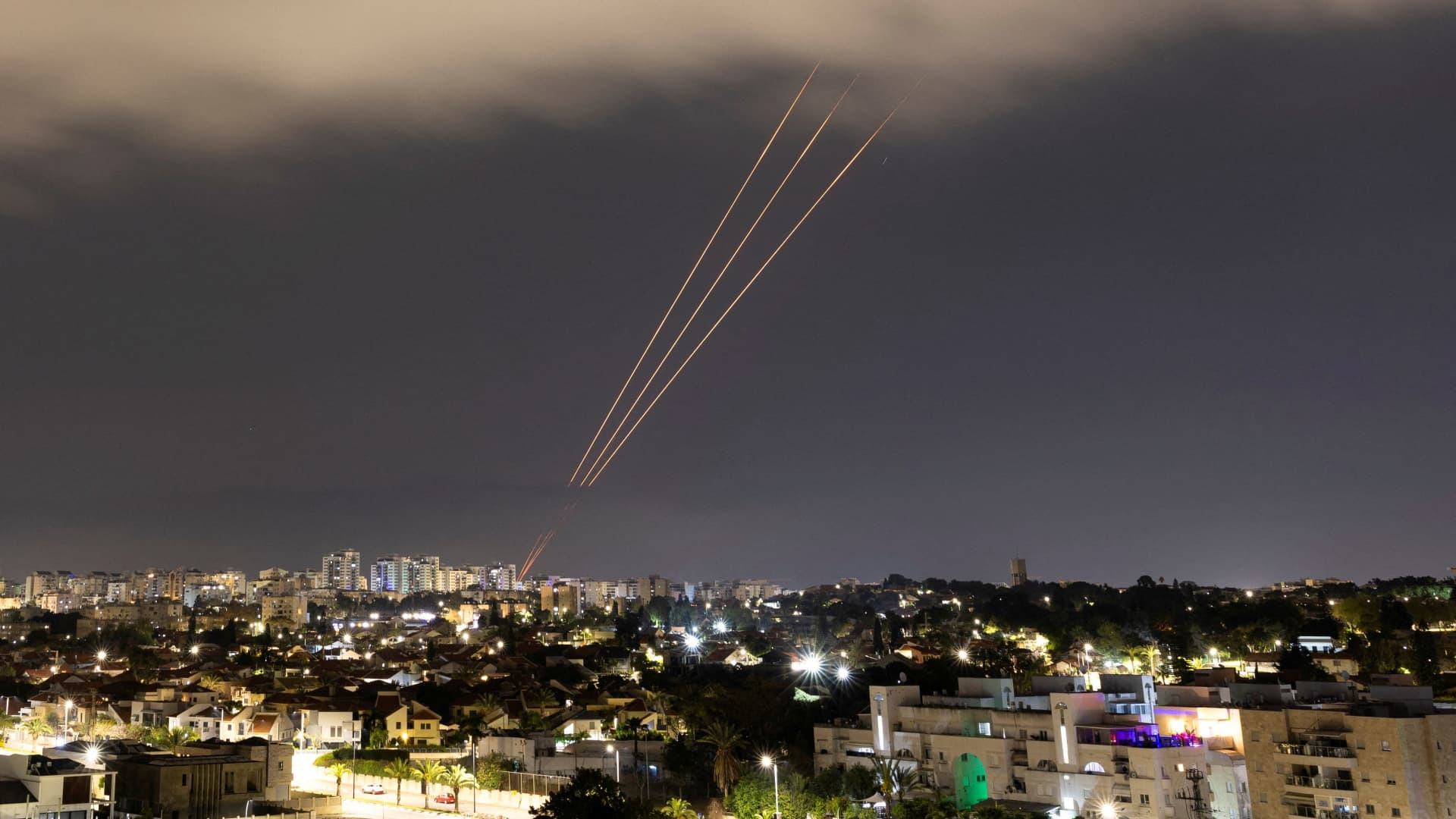An anti-missile system operates after Iran launched drones and missiles towards Israel, as seen from Ashkelon, Israel April 14, 2024.
Amir Cohen | Reuters
(View a special livestream of CNBC’s coverage of the conflict and market impact at 6 p.m. ET Sunday here.)
Crude oil futures were set to open higher Sunday after Iran launched an air assault against Israel with a barrage of missiles and drones, raising fears that the Middle East is spiraling toward a regional war that could disrupt oil supplies.
The West Texas Intermediate contract for May delivery hit a session high of $87.67 on Friday, while June Brent futures rallied to $92.18. U.S. crude closed at $85.66 a barrel Friday, while the global benchmark settled at $90.45. WTI futures began the year around $71 a barrel.
Iran launched more than 300 drones and missiles against military targets in Israel on Saturday in an attack that President Joe Biden described as “unprecedented.” The U.S. intervened to directly help Israel shoot down nearly all of the incoming munitions, Biden said in a statement Saturday.
The crude oil market is now bracing for the Netanyahu government’s response to the attack and waiting to see whether this marks the start of a direct war between Israel and Iran, according to Jorge Leon, senior vice president at Rystad Energy.
“In a worst-case scenario, a forceful retaliation by Israel could trigger a spiral of escalation, potentially leading to an unprecedented regional conflict,” Leon said Sunday in a note. “Under such circumstances, geopolitical premiums would increase significantly.”
The air assault was the first time Iran has directly attacked Israeli territory, senior U.S. military officials told reporters in a call Sunday. The attack was launched from locations in Iran, Iraq, Syria and Yemen, the officials said. More than 100 ballistic missiles were fired at Israel as well as land attack cruise missiles and drones, a senior administration official said.
The attack was retaliation for an Israeli strike against the Islamic Republic’s diplomatic facilities in Damascus, Syria earlier this month that killed seven Iranian military officials including a senior commander.
Though significant in scale, the Iranian attack caused little actual damage in Israel. The Nevatim Air Force Base in southern Israel suffered slight damage and a 10-year-old girl suffered severe injuries, according Israel Defense Forces spokesman Daniel Hagari.
Biden told Prime Minister Benjamin Netanyahu that his commitment to Israel’s security is ironclad but the U.S. will not participate in offensive operations against Iran, a senior administration official told NBC News.
U.S. National Security spokesperson John Kirby told NBC News’ “Meet the Press” Sunday that Biden does not want a wider with Iran. “The coming hours and days will tell us a lot,” Kirby said.
Israel Foreign Ministry spokesman Lior Haiat said Sunday that “Iran must pay a price for its aggression.” The Islamic Revolutionary Guards should be immediately declared a terrorist organization, Haiat said.
“Against Iran’s massive attack, Israel, like every country, has the right to self-defense, and Israel has defended and will continue to defend itself against Iranian aggression,” Haiat said on the social media platform “X.”
Iran has described the attack as a limited operation in which the Islamic Republic exercised its legitimate right to self dense after the missile strike on its diplomatic facilities.
“The matter can be deemed concluded,” Iran’s mission to the United Nations said on X. “However, should the Israeli regime make another mistake, Iran’s response will be considerably more severe.”
Iran’s U.N. mission warned the U.S. against intervening in the same message: “It is a conflict between Iran and the rogue Israeli regime, from which the U.S. MUST STAY AWAY!”

